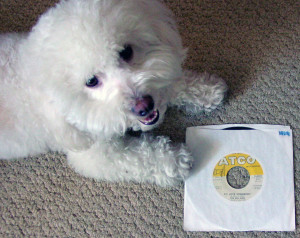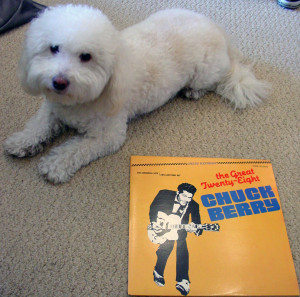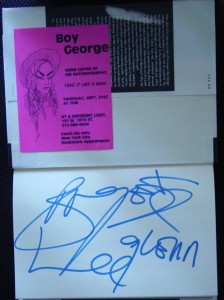It’s Mothers Day weekend. Today’s playlist consists of songs about mothers. Not mothers like Shaft, a bad mother shut-your-mouth. Real mothers.
Happy Mothers Day!
Click here to like Tunes du Jour on Facebook!
Follow me on Twitter: @TunesDuJour
It’s Mothers Day weekend. Today’s playlist consists of songs about mothers. Not mothers like Shaft, a bad mother shut-your-mouth. Real mothers.
Happy Mothers Day!
Click here to like Tunes du Jour on Facebook!
Follow me on Twitter: @TunesDuJour
Today is December 24. It’s the date when people around the world celebrate Ricky Martin’s birthday. What’s the first thing you think of when someone says Ricky Martin? Gay? I thought so. Hold that thought.
Christmas Eve is tonight. Many people around the world celebrate that as well, possibly almost as many people as the number that celebrate Ricky Martin’s birthday. He’s turning 43, by the way.
Anyhoosle, I decided to combine the two celebrations. Tunes du Jour hereby presents the gayest Christmas playlist ever. Fifty songs that will bring you cheer and fabulousity and get you arrested if you listen to them in Russia.
Have a festive day!
Click here to like Tunes du Jour on Facebook!
TRIVIA QUESTION: Who was the first woman to hit the top ten on the Billboard Hot 100 with a song she wrote herself?
ANSWER: Carla Thomas. She was 16 years old when she wrote “Gee Whiz (Look at His Eyes),” which hit #10 in 1961. Today she turns 72.
In 1963, Thomas incorporated the title of her first hit into a seasonal offering, “Gee Whiz, It’s Christmas.”
“Gee Whiz, It’s Christmas” inspires today’s playlist – fifty great soul and r&b Christmas jams, with some fun extra treats thrown in.
Click here to like Tunes du Jour on Facebook!

Ten facts about Barry Gibb:
• As a member of the Bee Gees and as a producer and writer, Barry contributed to more than half of the songs on the soundtrack to the film Saturday Night Fever. That album went on to sell 40 million copies and was the all-time best-selling album until it was outsold by Michael Jackson’s Thriller.
• The Bee Gees are the only group to have six consecutive singles go to #1, all of which were also written and produced by them – “How Deep is Your Love,” “Stayin’ Alive,” “Night Fever,” “Too Much Heaven,” “Tragedy” and “Love You Inside Out.”
• For twenty-seven of the thirty-seven weeks from December 24, 1977 through September 2, 1978, the #1 singles in the US featured Barry Gibb as a writer. The songs were the Bee Gees’ “How Deep Is Your Love,” “Stayin’ Alive” and “Night Fever,” Andy Gibb’s “(Love Is) Thicker Than Water” and “Shadow Dancing,” Yvonne Elliman’s “If I Can’t Have You” and Frankie Valli’s “Grease.”
• Barry Gibb wrote “Grease” without his brothers. It was Frankie Valli’s only #1 single not co-written by Bob Gaudio or Bob Crewe. At the time Gibb approached Valli about recording the tune, Valli didn’t have a record deal. It was Valli’s last top 40 single.
• For three weeks beginning March 18, 1978, Barry was the lead singer, co-producer or co-writer of four of the US’ top five singles – “Night Fever,” “Stayin’ Alive,” “(Love Is) Thicker Than Water” and Samantha Sang’s “Emotion.”
• Barry and Robin Gibb wrote “Emotion” for the film Saturday Night Fever. It wasn’t used in the pic; however, it was used in the Joan Collins film The Stud the following year.
• Gibb was a co-producer and co-writer of the Kenny Rogers/Dolly Parton duet “Islands in the Stream.” The record was a #1 country and pop hit, the last song to top both of those charts for 17 years. Barry Gibb said the song was written for Marvin Gaye to record.
• Dionne Warwick did not care for “Heartbreaker,” written by the Bee Gees, but she recorded it anyway, as she trusted the brothers’ judgment that it would be a hit. It sailed into the top ten in 1983, her first single to do so in four years.
• The Bee Gees-penned “Chain Reaction” was one of two #1 solo singles for Diana Ross in the UK, the other being “I’m Still Waiting.” Neither are amongst her 27 post-Supremes top 40 hits in the US.
• As a songwriter Gibb has had No. 1 songs in the 1960s, 1970s, 1980s, 1990s and 2000s.
Today Barry Gibb turns 68. Here are twenty songs he sang and/or wrote and/or produced.
Click here to like Tunes du Jour on Facebook!
On July 4, 1982, I went with my then-friend Robin to see Diana Ross in concert at Giants Stadium. I hadn’t been to the stadium before, but I figured on a typical day it was about a half hour drive from my home in New Jersey. As this was a holiday, I assumed there would be a lot of traffic, so I allowed for extra travel time. I didn’t want to be late.
We got to Giants Stadium five hours before show time. We parked right by the stadium entrance, went in, and found our seats. It was a beautiful sunny day, so we tanned as we waited for others to join us.
After a few hours other people showed up. The stadium was mostly full when the first opening act took to the stage. The band’s lead singer introduced them. “We’re Frankie Beverly and Maze for all you white people who don’t know who we are because you don’t listen to black music.” He sure knew how to charm an audience and win over new fans! I was momentarily ashamed that I spent my money to see and hear the white music of Diana Ross.
After Maze, Miles Davis performed. Would it have killed him to finish writing the songs before he came out? And hello, the audience is over here, not behind the curtain.
While Davis was playing, the couple sitting next to my then-friend Robin and me snorted cocaine. I’d never seen anyone do that before. They left after Davis finished, skipping the Diana Ross show altogether. That’s all I needed to see to keep me from ever doing coke. I don’t ever want to get to a point where I lose control over my thoughts and whereabouts and miss Miss Ross.
Finally, the main event. Diana Ross. Live. She performed all her big solo hits, except “Love Hangover,” and 30+ years later that still irks me. She did a medley of Supremes hits. She changed her clothes a few times. It was great!

Friday is dance day at Tunes du Jour, and while I could open today’s playlist with “Love Hangover” (Why, Miss Ross, why didn’t you preform that song???), I’m going to go with a more traditional 4th of July choice, James Brown’s “Living in America,” one of the very few Brown hits that the man neither wrote nor produced. Happy holiday!
A company I worked for – I won’t say which one – has an amazing catalogue of rhythm & blues music, arguably the best r&b catalogue of any record label. Despite possessing this goldmine, most of our catalogue releases were from white rock bands. I asked a member of senior management why we didn’t do more with our black artists, and the answer I got was “We don’t know how to sell that music.”
Is that not a stupid response? If you don’t know how to do that, hire someone who has that expertise, or learn how to do it. Why ignore a large swath of your potential market, especially when you already own the assets?
Years ago I was put in charge of licensing at a record label. I knew the music and I knew the components of licensing deals; however, I wasn’t a very good negotiator. I found the process intimidating. I could have left it at that – “I don’t know how to negotiate.” My company would have made money nonetheless, though not at its full potential. For that matter, I wouldn’t be working at full potential.
I took a course in negotiations. Six weeks, $300. Money well spent. I put what I learned in the class into action. Practice makes perfect, and I became an excellent negotiator. In my four years at that company our licensing revenue increased 400%. My skills also led to my next job as the Vice President of Licensing at another company.
Is a lack of some skill or knowledge holding you back? Fix that. Read a book, attend a seminar, take an on-line course or find a mentor. Saying “I don’t know how” won’t lead to success; learning how will.

Today is the last day of Black Music Month. It would be ludicrous to think a 40-song playlist would cover black music in any comprehensive way. Enjoy it for what it is – nearly three hours of fantastic music. Listen to it while you research how to learn a new skill.
Down the street from my first full-time job at CBS Records was a bookstore. Two blocks down from that bookstore was another bookstore. Around the corner from my office was a Sam Goody music store. Often these stores hosted book/record/CD signings. During my lunch hour I’d wait on line to buy the new release from someone I admire and get them to autograph it at the same time. I met former Supreme Mary Wilson, David Johansen (as Buster Poindexter), and Liberace. I guess it wasn’t always someone I admire. While she was signing her latest CD for me, I told Sandra Bernhard that we had met once before. She responded, sarcastically, “Who could forget?”
When I got to the front of the line to meet Joan Rivers and was face to face with her, I said “Oh, it’s you. I thought I was here to meet Joan Collins.” She responded something to the effect of “Sorry. You got me.”
I met Tipper Gore at a signing of her then-new book Raising PG Kids in an X-Rated Society, or something like that. There was literally nobody there to meet her. Nobody except me. Perhaps it was obnoxious of me to say “Nice turnout, Tipper,” but this was back when she was campaigning to have warning labels put on records, an idea I found silly. She was a good sport, though. We ended up chatting for about ten minutes, each explaining his/her viewpoint. After our chat she asked “Are you going to buy my book now?” I told her no, and she said “Take it out from the library. It’s cheaper,” to which I replied “You’re a great salesperson, Tipper.” She laughed.
I don’t remember what I said to Prince when I met him, but I do recall him looking at me as if of the two of us, I was the weirder one.
I couldn’t speak when I met Tina Turner. Her skin was so smooth and flawless it left me dumbfounded.
Years later I met Kathy Griffin a a DVD signing that was immortalized on her reality show My Life on the D-List. The show did not exaggerate the situation – only eight or so people showed up.
I was excited to meet Boy George when he published his autobiography in 1995. I’ve been a fan of his since the first time I heard Culture Club’s first US single, “Do You Really Want to Hurt Me.” The group’s fourth album, From Luxury to Heartache, included a song called “Gusto Blusto.” A DJ played it on the radio and then said “I can’t tell you what Gusto Blusto means on the air.” Finally I had the opportunity to ask the song’s writer what that expression means. I asked George. He laughed and said “I don’t remember.” Thanks, George!

Yesterday Boy George turned 53 years old. Here are ten tracks of his you should know.
The Tony Awards, celebrating excellence on the Broadway stages, are being presented this evening. The Tony Awards are like the gay version of the Tony Awards. That’s how gay they are.
Last year I took second place in a speech contest where I spoke about the effect Broadway had on my life. Here is that speech, followed by a playlist consisting of cover versions of Broadway classics.
By 1966, Barrett Strong, the singer on Motown Records’ first hit single, “Money (That’s What I Want),” had the core of a song based on expression that emanated from the Civil War era. Slaves in the United States passed along information via a “human grapevine.” In Strong’s time he often heard people passing along gossip, saying they “heard it through the grapevine.” With that line as the chorus and a bass line, he brought the song to Norman Whitfield, who added lyrics about someone who hears gossip that their lover is unfaithful and will leave him/her for another lover.
Whitfield produced a version of their new song, “I Heard It Through the Grapevine,” with Smokey Robinsons and the Miracles, but Motown chief Berry Gordy, Jr. rejected it.
In 1967, Whitfield entered the studio with Marvin Gaye. At the time Gaye was married to Berry Gordy’s sister Anna. Gaye heard that Anna was being unfaithful to him. The lyrics surely resonated with him (though in (un)fairness, he was cheating on Anna). To wring more emotion out of Gaye, Whitfield had him perform the song in a higher key than he normally used. This did not sit well with Gaye, who is quoted in his biography as saying “Norman and I came within a fraction of an inch of fighting. He thought I as a prick because I wasn’t about to be intimidated by him. We clashed. He made me sing in keys much higher than I was used to. He had me reaching for notes that caused my throat veins to bulge.”
All may have been for naught, as Berry Gordy rejected the Gaye recording as well.
In June of 1967, Aretha Franklin went to #1 with her version of Otis Redding’s “Respect.” With that record as his model, Whitfield again brought “I Heard It Through the Grapevine” into the studio later that year, this time with Gladys Knight and the Pips. This version was faster than the versions he produced for the Miracles and Gaye, with the intention to “out-funk” Aretha.
Gordy reluctantly approved the Pips version for release. It rose to #2 on the pop chart and went to #1 on the r&b chart, where it remained for six weeks. It became Motown’s biggest-selling single to that point.
The Gaye version ended up on his 1968 album In the Groove. The first single from that album, “Chained,” hit #32 on the pop chart. “Grapevine” got the attention of some radio disc jockeys, who gave it airplay. Said Gordy, “The DJs played it so much off the album that we had to release it as a single.”
Marvin Gaye’s version of “I Heard It Through the Grapevine” was released as a single in fall of 1968. In mid-December it went to #1 on both the pop and r&b chart, and stayed on top of each for seven weeks, becoming Motown’s biggest hit to date. The week this went to #1 on the pop chart, Motown had the top three hits (#2 was “Love Child” by Diana Ross & the Supremes and #3 was “For Once in My Life” by Stevie Wonder.) The company held onto the top three for four consecutive weeks. “I Heard It through the Grapevine” bookended the r&b #1 slot in ’68 – the Pips’ version was #1 on January 1 and Gaye’s was #1 on Dec. 31.
By the time his “Grapevine” was released Marvin Gaye already had 23 top 40 pop hits. This was his first #1.
Gaye’s version made Rolling Stone’s list of the Greatest Songs of All Time and was inducted into the Grammy Hall of Fame.
“I Heard It Through The Grapevine” was the first collaboration between Barrett Strong and Norman Whitfield. The duo went on to compose “Papa Was a Rollin’ Stone” and “Just My Imagination (Running Away with Me)” for The Temptations.
Marvin Gaye died at age 44 on April 1, 1984, shot to death by his father the day before his birthday. The gun used was a Christmas present from Marvin.
In 1964 the Motown songwriting/production team of Brian Holland, Eddie Holland and Lamont Dozier wrote a composition intended for The Marvelettes, who by that time had two top ten pop singles under their belt – “Playboy” and “Please Mr. Postman,” both co-written and co-produced by Brian Holland.
The three men went into the studio and had the instrumental track recorded, but when Lamont Dozier played the song and presented the chorus to The Marvelettes’ Gladys Horton, he got a response he wasn’t expecting. “Oh, honey, we don’t do stuff like that. And it’s the worst thing I ever heard,” she told him. In case he was still unsure how she felt, she added “No way am I gonna sing any junk like that!”
Dozier went through the Motown roster to see who he could get to record this number. He ended up with the group at the very bottom of the list, a trio of women signed to Motown several years earlier, but who had no big hit records to their name. Originally a quartet called The Primettes, the group had released nine singles, only one of which, a song written by Holland-Dozier-Holland entitled “When the Lovelight Starts Shining Through His Eyes,” made the top 40, reaching #23. Initially they declined Dozier’s offer to record the song, finding it childish, repetitive and too slow, but they soon changed their mind, as they had no other material to record.
The three women in the trio, known around the Motown offices as “The No-Hit Supremes,” all sang lead vocals. As the instrumental version of this new track had already been recorded in the register in which Gladys Horton sings, the producers thought Mary Wilson, who sang in the same range as Horton, should handle the lead vocals, but Motown head Berry Gordy, Jr. wanted one of the other Supremes, Diana Ross, to be the group’s lead vocalist.
Ross complained that the music was in the wrong key, but was told to sing it the lower key. She wasn’t crazy about doing so, nor were the other two women eager to learn the intricate background vocals that had been written. Because of their bad attitude, Dozier told them to just sing “Baby, baby.”
On June 17, 1964, Motown released the track, entitled “Where Did Our Love Go,” as a single. As the “No-Hit Supremes” toured as part of Dick Clark’s American Bandstand Cavalcade of Stars, where they received credit at the bottom of the poster as part of “And Others,” the song climbed the charts. It hit #1 in August 1964, and by the time the tour ended, the Supremes had top billing.
Holland-Dozier-Holland went on to write many more songs for the Supremes, including their next four singles, all of which went to #1. The women scored twelve #1 pop hits between 1964 and 1969, ten of which were written by the same trio of men who came up with “Where Did Our Love Go,” which made Rolling Stone’s list of the 500 Greatest Songs of All Time.
Today Tunes du Jour celebrates the woman who may not have become a household name had she not given in to recording the now classic tune. Happy 70th birthday, Diana Ross!